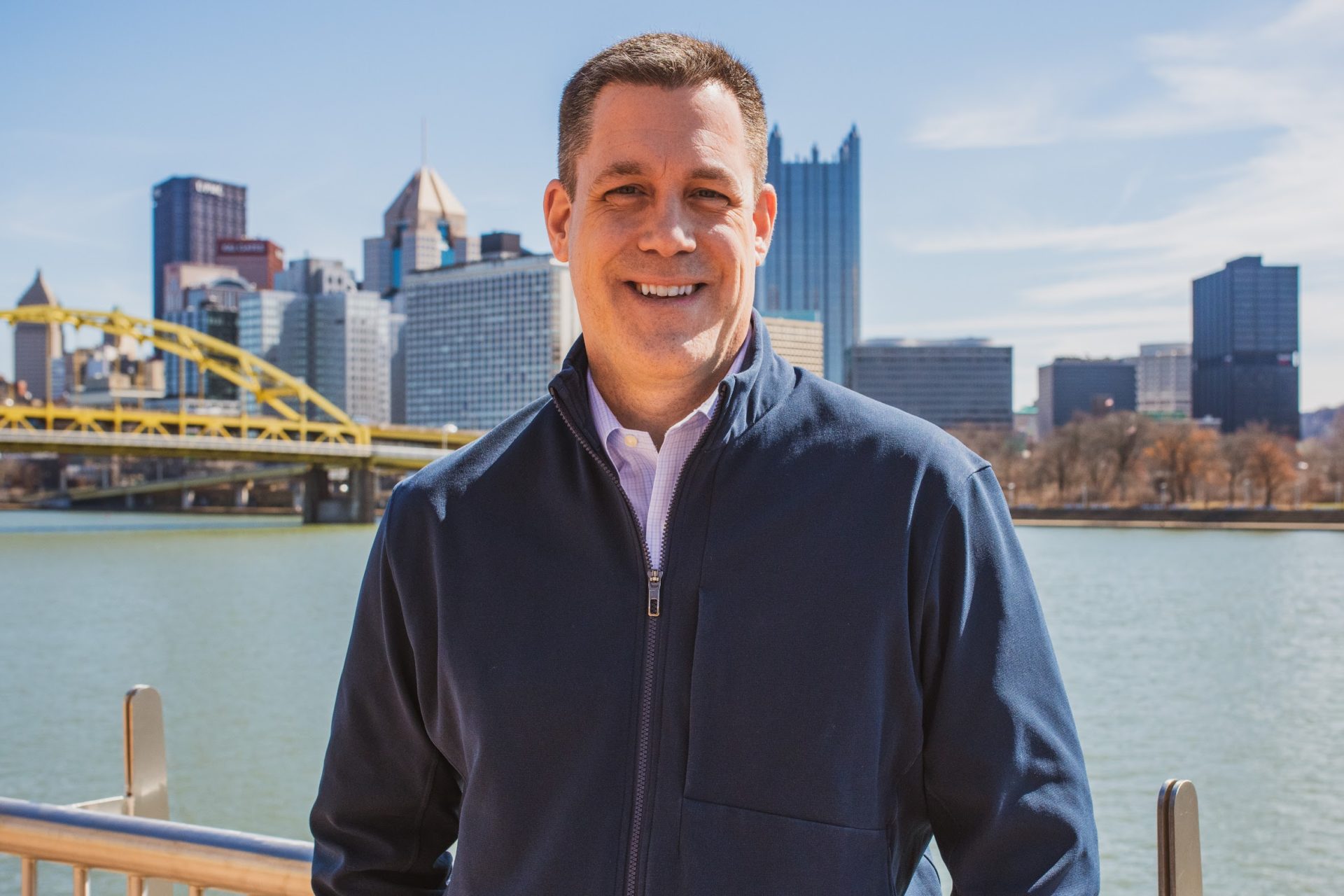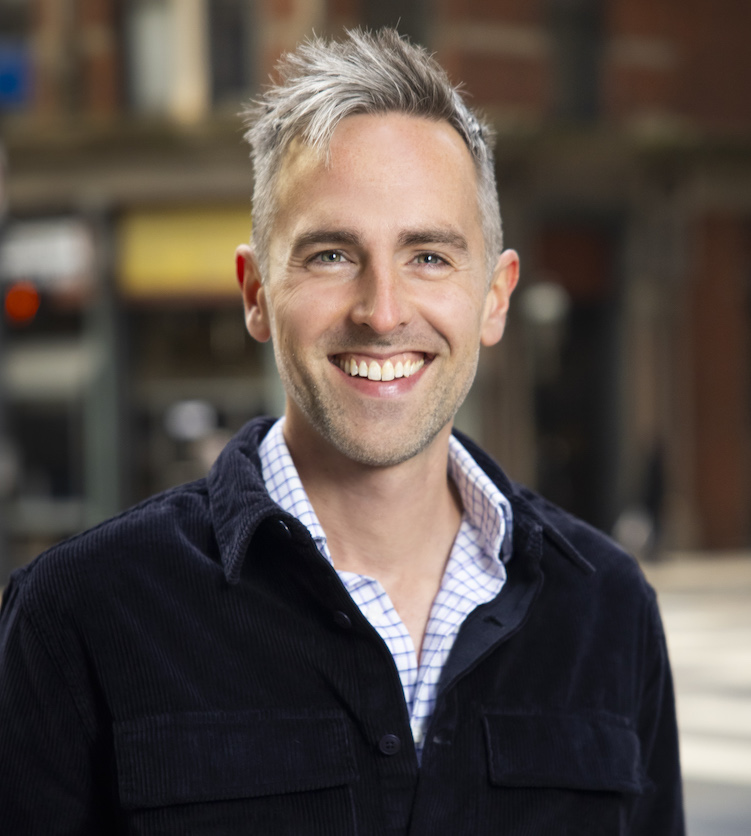Fred Rogers’ work calls for grownups to pause and reflect deeply on the purpose of learning. We really need to begin seeing each individual kid as special, just the way they are. I believe we all want great things for kids.
Gregg Behr, Executive Director, Grable Foundation
We connected with Gregg Behr and Ryan Rydzewski, co-authors of the newly released book When You Wonder, You’re Learning, to discuss the impact and legacy of Mister Rogers’s life and work—which created the foundation for their book. They also explore why the empathy and sense of community Fred evoked, and the authentic listening he practiced while helping kids make sense of the world, are needed, more than ever.
Q. What influence did Mister Rogers have on your life?
Gregg: Like a lot of people in America, Mister Rogers is a childhood hero. He is this very warm and loving figure that evokes a lot of cherished childhood memories. I vividly remember sitting down to watch Mister Rogers’ Neighborhood with my brother and mom.
He gave kids a real sense of belonging, a space to have their questions answered, and a chance to explore new things. When I think of Fred Rogers, I think of love.
I still remember lying in bed the morning they announced Mister Rogers had died. My alarm clock went off at the top of the hour, when NPR typically starts. That day, they began the show by playing the theme to Mister Rogers’ Neighborhood. I immediately sat up, because I knew what they were about to tell me.
It’s the only time in my life that I’ve cried when someone that wasn’t a family member or close friend passed away. I’d had the privilege of meeting him once, but I felt like I’d known him my whole life.
Ryan: I share Gregg’s emotional nostalgia for Fred. Gregg and I are both Western Pennsylvania kids, and because Mister Rogers is from Pittsburgh, it always felt like he was ours, even though we were sharing him with the whole world.
And, through creating this book, we’ve really come to appreciate a whole new dimension of Fred Rogers: the learning scientist who was, in many ways, 50 years ahead of his time when it comes to understanding how children learn. He put a lot of rigorous work and heart into creating The Neighborhood.
Q. Why do you feel Mister Rogers’ lessons still resonate today, and how did you draw from those lessons to write When You Wonder, You’re Learning?
Gregg: Two things come to mind. First, Fred Rogers was present in our lives and the lives of kids, more broadly, for four decades, and he became a very trusted public figure. Second, as we look back on his life, it’s clear that Fred got a lot of things right, in particular with regard to how he prioritized goodness and love. Those are feelings that I think so many of us crave in our lives, our communities, and for our nation. His memory is at the core of what we want to be and what we want our neighborhoods to be.
And, he’s been a great source of inspiration for our work and that of Remake Learning in the field of learning and education.
When the work of Remake Learning first took hold in 2006 and 2007, we were bringing together educators, librarians, youth workers, roboticists, technologists, designers, and others; these were the people who ultimately came to be the Remake Learning network. It was in engaging these people that we began to develop this deeper appreciation for Fred Rogers.
In many ways, they were already applying what we call the “Fred method.” They were drawing on the concept of whole child development as modern day learning scientists, working to understand how kids today see the world, what’s awaiting them in the future, and how we can best reach them. Fred Rogers’ sensibilities really gave us a blueprint from which to evolve the work of Remake Learning. He gave us a great connection to the past and particularly to those who were thinking about education the way we are today.
He was a deliberate and methodical learning scientist who had studied with some of the premier learning scientists of his day. If you go back to the fifties and sixties in Pittsburgh, you had folks like Benjamin Spock, Erik Erikson, and Margaret McFarland. They are among the 20th century Pantheon of child development theorists and practitioners, who were deep in whole child theory.
Kids should feel they have the freedom to learn about whatever it is they’re passionate about pursuing or become whoever it is that they want to become.
Ryan Rydzewski, Author
As Ryan mentioned, he was more than just a caring and loving television figure in a red sweater. Mr. Rogers, like those experts, was a disruptor and innovator. He was radical in a way that many of us in the education field have grown to really appreciate. He was connecting kids to the future and the world—and all its complex problems—in ways they could understand.
He demonstrated a profound respect for childhood, childhood development, and who kids are as individuals on a journey of learning. There’s something that he was trying to convey to us as adults, which is to respect the sacredness of childhood and to return to our own core as children in the context of trying to raise caring, curious, and confident kids in today’s world.
When You Wonder, You’re Learning focuses on bringing Mister Roger’s rich 50-year legacy forward in ways that are future-facing. Each chapter is set up with a theme that’s grounded in Mister Rogers’ Neighborhood. Each chapter tries to illuminate the contemporary learning sciences in practical and readable ways, and offers several examples to drive it all home.
In cities like Washington, DC and Pittsburgh, there are librarians, teachers, scientists, and others who are employing the Fred method of connecting timeless and classic with innovative and future-facing in ways that are grounded in respect for a child.
We offer Fred Rogers’ inspired tools for learning in your home, classroom, and really anywhere.
Ryan: Until we started writing this book, the specifics of The Neighborhood had faded for me a bit. But, what remained in my memory was Fred’s aura.
When we went back to watch episodes of the show as research for the book, I recognized how honest Fred was with kids. He was willing to show kids that it’s okay to wonder about, face up to, and be scared of the very real—and often, very bad —things that happen in the world. One of the core things that Mister Rogers emphasized was listening, which is interesting because he couldn’t hear his audience, except through the mail.
If you go to the Fred Rogers archive, there are four or five decades worth of mail that he received from people all over the country. He received mail from kids and adults, and in many cases, you can draw a direct through line from what people shared in those very personal letters, to what he talked about in The Neighborhood.
He always started with what viewers cared about or were curious about. That listening goes back to that deep respect for childhood that Gregg also mentioned. It was an intentionality that was built into every script, song, and set piece. Every episode features a field trip, documentary, guest speaker, or member of the neighborhood stopping by to share something that they are really enthusiastic about. The Neighborhood is one of the few places where kids (and others) were given a warm welcome into a world of possibility.
There are a lot of parallels to the work of individuals in Remake Learning’s network. There’s a lot of intentionality around offering kids a similar sense of sanctuary, honesty, and endless possibility. Kids should feel they have the freedom to learn about whatever it is they’re passionate about pursuing or become whoever it is that they want to become. At the same time, they should feel that they’re enough. One of the things Rogers always said is, “I like you right now, exactly as you are.”
Q. What causes kids to lose their sense of wonder and curiosity during their learning journey?
Ryan: One of the first things that comes to mind is something that Dr. Valerie Kinloch, the Dean of the University of Pittsburgh School of Education, said during an interview for our book.
She emphasized that it needs to start with adults asking new questions of kids. She wanted to know why we don’t start by asking kids, “What do you dream about doing, but are never asked to talk about?” I don’t know that we give kids—especially older kids—the opportunity to start with what’s authentic to them and what moves them.
There’s often a big difference between what adults want kids to know and what kids want to learn. The more aware we are of that difference, the better we can get at bridging the gap between them. We need to make more space for curiosity and wonder in our learning spaces.
Gregg: Fred Rogers’ work calls for grownups to pause and reflect deeply on the purpose of learning. We really need to begin seeing each individual kid as special, just the way they are. I believe we all want great things for kids.
But, first, as Fred reminds us, we have to make goodness possible. And, we need to begin in those younger years by respecting childhood for what it is. We have to create safe spaces where kids can develop their own identity, feel like their questions are respected, and know that they belong and are loved—and know that they’re capable of loving, as Fred would say. It’s only in that environment that any learner can then be curious, creative, work authentically with others, and fully be themselves.
Q. In the context of making goodness possible, being a part of a community plays a critical role in enabling that. What lessons about enabling kids to engage with and contribute to their community can we draw from Mister Rogers?
Gregg: With regards to Fred Rogers’ show, it was The Neighborhood, not the school house. I suspect he knew then what we often hear repeated now, which is that kids spend only a fraction of their waking hours in a school building. The rest of time is spent at home, in a library, in an after school program (or elsewhere).
The tools for learning we offer in our book aren’t limited to school, because learning happens everywhere and at any time. The book is about getting adults to support that reality.
As an example, in Daniel Tiger’s Neighborhood, a contemporary animated version of Mister Rogers’ Neighborhood, the number of adults featured outnumber the kids by three to one. It wasn’t obvious to me at first, but when someone at Fred Rogers Productions pointed that out, you couldn’t unsee it. The program is about what adults are doing to create caring and loving environments in the places that kids frequent, such as the grocery store, bus stop, or waiting room at the doctor.
Ryan: Mister Rogers’ Neighborhood could probably be described as a modern manifestation of the very old idea that “It takes a village.” The educators who visited The Neighborhood included classroom teachers, artists, the speedy delivery man Mr. McFeely, and even wait staff from a restaurant.
The lessons they impart don’t represent the kind of learning that we can measure. It is the kind of learning that helps you make sense of the world and see that everyone in your community makes an important contribution to the richness of that community. It captures the immeasurable feeling of being welcome in your community, wherever you go.
Q. What would Mister Rogers say about the state of education today?
Gregg: Joanne Rogers, Mister Rogers’ wife, who was such a champion for this project and provided us with the gift of writing the Foreword for this book, often reminded us that Fred Rogers wasn’t a Saint, he was a human being.
She emphasized that we shouldn’t think about what Fred would do. But, instead, we should think about what Fred would want us to do as our best selves in this world. The question is: “How do we call upon what we know and what we’ve learned?”
Ryan: We certainly can’t speak for Fred. But, knowing what we know about him, I think he would acknowledge that it’s been really hard trying to navigate learning during a pandemic. But, I also think he’d be proud that, in many ways, these challenges brought out the best in kids and those committed to supporting them.
I think he would be very proud of the advocates trying to transform education and especially the advocacy we’ve seen over the last year. I think he’d be very proud of the educators who are trying to reinvent their profession. I think he’d be proud of the parents and families who have helped to bring their kids through the worst and most unprecedented year in recent memory.
And, above all, I think he’d be proud of young people’s resiliency and willingness to try new things with regard to where and how they are learning.
Q. What’s the main takeaway from When You Wonder, You’re Learning you want to leave your readership with?
Gregg: Ryan and I are hopeful that this book adds to a mindset that there are people in all corners of the country (and world) imagining how we can transform learner environments post-pandemic. It’s been incredibly gratifying to hear educators reach out and share that, “This book refueled me during a challenging time.”
Ryan: There are parents, teachers, caregivers, siblings, and kids doing their best to help others make it through a really difficult time. I think the most exciting thing we discovered, over the course of writing this book, was that the blueprint and inspiration we’re looking for to push forward already exists in the form of a very familiar figure, who almost everybody loves: Fred Rogers. It’s just one more reason to love The Neighborhood.


